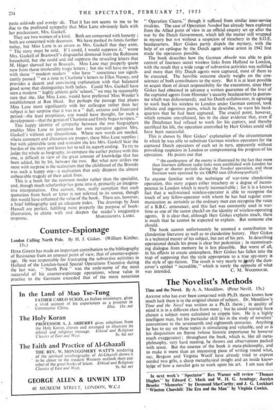Counter-Espionage
HERR Gisices has made an important contribution to the bibliography of Resistance from an unusual point of view, that of counter-espion- age. He was responsible for frustrating the subversive activities in Holland of the London-based Special Operations Executive during the last war. " North Pole " was the code-name of the most successful of his counter-espionage operations, whose value in practice to the Germans exceeded that of the more notorious " Operation Cicero," though it suffered from similar inter-service rivalries. The case of Operation Nordpol has already been explored from the Allied point of view in an official enquiry set up after the war by the Dutch Government, which left the matter still wrapped in mystery but not without a suspicion of treachery in the S.O.E. headquarters. Herr Giskes partly dispels the mystery, with the help of an epilogue by the Dutch agent whose arrest in 1942 first made the operation possible.
The book describes how the German Abwehr was able to gain control of fourteen secret wireless links from Holland to London, with the result that a wide range of subversive activities was nullified and more than fifty Dutch agents were captured, most of them to be executed. The horrible outcome clearly weighs on the con- sciences of both contributors to the story. But it is at least possible to acquit them of direct responsibility for the executions, since Herr Giskes had obtained in advance a written guarantee of the lives of the captured agents from Himmler's security headquarters (a guaran- tee which was dishonoured); and his Dutch collaborator, in agreeing to work back his wireless to London under German control, took infinite and ingenious pains, which he describes, to warn his head- quarters that he had been captured. The crucial point, however, which remains unexplained, lies in the clear evidence that, even if the Dutchman had refused to work for his captors, and thereby sacrificed his life, the operation controlled by Herr Giskes could still have been successful.
This is shown by Herr Giskes' explanation of the circumstances in which he was able to substitute German wireless operators for the captured Dutch operators of each set in turn, apparently without provoking suspicion in London or compromising the progresS of his operation. He points out that " the carelessness of the enemy is illustrated by the fact that more than fourteen different radio links were established with London for longer or shorter periods during the Nordpol operation, and these fourteen were operated by six ORPO men (Ordnungspolizei)."
To anyone familiar with' the technique of war-time clandestine operation, this story argues either treachery or a degree of incom- petence in London which is nearly inconceivable ; for it is a known fact that a well-trained wireless-operator is able to recognise the touch of any fellow-operator with whom he has had regular com- munication as certainly as the ordinary man can recognise the voice of a B.B.C. announcer, and this fact was constantly used in war- time as one of the surest check on the identity of wireless-operating agents. It is clear that, although Herr Giskes explains much, there is much that he cannot be expected to explain. But someone else should.
The book cannot unfortunately be counted a contribution to clandestine literature as well as to clandestine history. Herr Giskes is a technical master of his subject, but not of his pen. In describing operational details his prose is clear but pedestrian ; in reconstruct- ing dialogue from memory he is less plausible. But worst of all, in his efforts to create atmosphere, Herr Giskes has fallen into the trap of supposing that the style appropriate to a true spy-story is the style of spy-fiction. The result is very nearly to jestify the dust- cover's epithet " incredible," which is surely the opposite of what


































 Previous page
Previous page